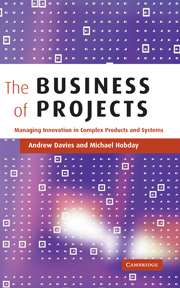Book contents
- Frontmatter
- Contents
- List of figures
- List of tables
- Foreword
- Acknowledgements
- Glossary
- 1 Introduction
- 2 The dynamics of innovation in complex products and systems
- 3 Business strategy and project capability
- 4 Systems integration and competitive advantage
- 5 The project-based organisation
- 6 Managing software-intensive projects
- 7 Learning in the project business
- 8 Integrated solutions for customers
- 9 Lessons for the project business
- Appendix A
- Appendix B
- Appendix C
- References
- Index
6 - Managing software-intensive projects
Published online by Cambridge University Press: 22 September 2009
- Frontmatter
- Contents
- List of figures
- List of tables
- Foreword
- Acknowledgements
- Glossary
- 1 Introduction
- 2 The dynamics of innovation in complex products and systems
- 3 Business strategy and project capability
- 4 Systems integration and competitive advantage
- 5 The project-based organisation
- 6 Managing software-intensive projects
- 7 Learning in the project business
- 8 Integrated solutions for customers
- 9 Lessons for the project business
- Appendix A
- Appendix B
- Appendix C
- References
- Index
Summary
In many high-technology industries embedded software and information technology more generally are the core technologies that must be mastered for competitiveness in project business. In the past 20 years or so these technologies have become a major technical challenge to project business. Firms need to acquire deep capabilities in software engineering and learn how to efficiently manage large, complex software projects to their advantage. IT-based management systems and tools are essential not only for managing software and IT projects themselves but also for most types of complex project. Today, it is difficult to find any large complex project which does not utilise software and IT one way or another.
Focusing on the case of flight simulation, this chapter examines the particular difficulties generated by the management of software-intensive projects in CoPS. One of the accepted international best-practice instruments for managing and improving software development is the capability maturity model developed by the Carnegie-Mellon Software Engineering Institute in the US. This is now widely adopted by professional software firms in many countries and operates rather like the ISO9000 quality system. However, our case research shows that CMM, on its own, cannot improve the quality of software or efficiency in design or production. This is because it does not sufficiently address the human or soft side of an organisation's capability.
- Type
- Chapter
- Information
- The Business of ProjectsManaging Innovation in Complex Products and Systems, pp. 148 - 183Publisher: Cambridge University PressPrint publication year: 2005



